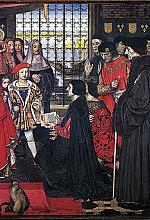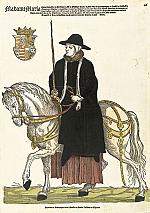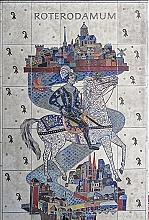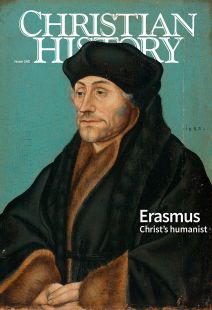Living the simple life
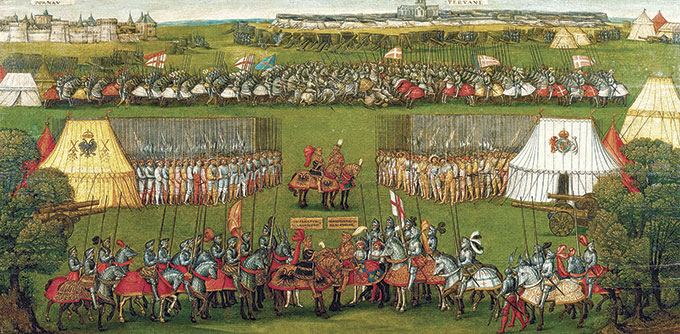
[Anonymous, The Meeting of Henry VIII and the Emperor Maximilian I, c. 1513. Oil on panel—Royal Collection / Public domain, Wikimedia]
Among the many paradoxes of Erasmus’s life and career is the fact that this staunch critic of late medieval monasticism was himself a monk who never renounced his vows or ceased to identify, in some sense, with the monastic vocation.
Placed in the Augustinian house at Steyn (a different Augustinian order than Luther’s) in 1487 by his guardians after his parents died, Erasmus took solemn vows in 1488. In 1493 he left, never to return, and in 1517 he obtained final and definitive sanction from the pope to live the life of an independent scholar. He repeatedly expressed distaste for the monastic life and claimed he had been pressured to join the convent and never had a genuine vocation. And yet he continued to refer to himself as an Augustinian.
The world as one monastery
Erasmus distinguished between contemporary monasticism and the original monastic ideal—embodied above all in Jerome—in his youthful work De Contemptu Mundi or On Despising the World (1521), written while still in the monastery. He followed this with the Antibarbarians, a savage attack on the anti-intellectualism he found in actual contemporary monasticism. Erasmus compared ideal monasticism to the thought of often misunderstood pagan philosopher Epicurus (341–270 BC), who taught that the ideal life was quiet seclusion and contemplation with moderate enjoyment of physical pleasures. For Erasmus true monasticism allowed the monk to live in seclusion from the world—the domain of violence, competition, material acquisition, and sensual pleasure—and to pursue the only pleasures that truly mattered, contemplation and study.
At his core, though, Erasmus called all Christians to embrace this way of life in their particular circumstances. In a 1514 letter to the prior of Steyn, his friend Servatius Rogerus, he defended his refusal to return to the monastery:
How much more in accordance with the sentiment of Christ, to regard the whole world as one household, or as it were one monastery, to think of all mankind as our brethren or fellow canons, to hold the sacrament of baptism as the highest order of religion, and not to look where a man lives but how well he lives.
In 1518 Erasmus reprinted his influential guide to holiness for lay Christians, the Handbook of a Christian Soldier. He bemoaned the separation between monastic and lay Christian life in a long prefatory letter to Benedictine abbot and humanist Paul Volz (1480–1544): “Why do we so limit the profession of Christ, which he wished to extend most widely? . . . I beseech you, what else is a city but a great monastery?” In the Handbook itself, Erasmus exhorted his lay aristocratic audience to be true soldiers of Christ:
There is no third way. . . . If you are in the world, you are not in Christ. If you mean by the world the earth, the sea, and this common air, and heaven, then everyone is in the world; but if you identify the world with ambition, delights, desire, lust—indeed, if you are a dweller in the world in this sense of the word, you are not a Christian.
Since the eleventh century, Western Christian movements had sought to bring the gospel into a more transformative relationship to lay life (see CH issue #110). The mendicant orders, with whose members Erasmus frequently tangled, had played an important role in this, as had his own order of Augustinian canons. So had the Brethren of the Common Life (see issue #141), a group of laypeople and monks originating in the Netherlands. They promoted holy living in “the world,” and their most famous text was The Imitation of Christ by Thomas à Kempis. Erasmus criticized his education by them as harsh and narrow but continued to be committed to their vision in his own way.
The virtuous prince
Erasmus’s own way led him to humanism (see pp. 11–14). Humanists were fundamentally literary scholars; they believed that studying and imitating proper models for speech and writing would improve one’s character and create a class of leaders nurturing a free and virtuous community. One early humanist, the poet Petrarch (1304–1374), summed up the difference of approach between humanism and scholastic philosophy by arguing that for humanists it was more important to will the good than to know the truth.
“Civic humanists” of the Italian city-states, while mostly devout Christians, drew on classical pagan models of virtue, emphasizing human free will and taking an optimistic view of human potential for virtue. They tended to see impulses toward glory as praiseworthy if the glory sought was honor from wise and good people for genuine accomplishments that served the common good.
By Erasmus’s time, however, these Italian city-states had largely lost their republican governments. First they came one by one under the sway of military strongmen or wealthy bankers. Humanists focused their efforts on teaching these “princes” to pursue power and glory through moral means. Then in 1494, just as Erasmus was beginning his career as a traveling intellectual, the king of France invaded Italy. This sparked a series of wars, lasting until 1559, during which Italy formed the primary battleground for extended conflict among the great powers of Europe—especially the French and the Habsburgs, rulers of Austria and the Netherlands. Eventually the Habsburgs gained control of Spain as well, making them a superpower, if a rather cumbersome one.
The papacy, which ruled much of central Italy, served as a power broker, even though in strictly military terms it did not equal the great powers. But the popes of the early sixteenth century did not neglect military power. Alexander VI (1431–1503) carved out a state in north central Italy for his illegitimate son Cesare Borgia; Julius II (1443–1513) led armies and adroitly switched sides, striving to drive out “barbarian” invaders and establish papal dominance in Italy.
During Julius’s pontificate Erasmus arrived in Italy for the first time, in 1506. The pope’s triumphal entry into Bologna was one of the first things he saw, and his disgust at the spectacle reverberated through his writings for years to come. Nothing was more fundamentally contrary to Erasmus’s vision of Christianity than a pope leading armies.
Already weakened by homegrown despots, Italians found it hard to maintain ideals of republican liberty among clashing superpowers. The most famous Italian humanist of the era, Niccolò Machiavelli (1469–1527), represented one possible response. His treatise The Prince (1532, though written earlier) called for realism and an analysis of how power actually works rather than how it ought to work.
Excuses for war
In contrast to Machiavelli’s ruthless realism, Erasmus offered an uncompromisingly idealistic, deeply Christian political vision. Many of his positions, seeming naïve and idealistic in his own time, look remarkably farsighted today. While not rejecting monarchy, he argued for a constitutional monarch with royal power limited by councils representing the interests of the people.
He thought the medieval just war tradition had become little more than an excuse for monarchs to justify waging offensive war, and he hated mercenary soldiers, the backbone of sixteenth-century armies and often as much of a menace to civilians as to the enemy. Erasmus suspected monarchs of colluding to wage war on each other to increase their power over their own subjects and criticized the principal peaceful alternative, dynastic marriage—the primary means by which the Habsburgs had amassed their massive multinational empire.
Like most Renaissance humanists, Erasmus believed in the power of education to shape character. He thought one root of monarchs’ irresponsible behavior was the chivalric education they received—instruction in physical skills such as riding and fighting, combined with ancient and medieval heroic stories, such as the Arthurian legends, which glorified war and adulterous love. He thought a virtuous young prince should study classical history and philosophy and above all read the Gospels. All this would teach the prince to promote peace and the welfare of his subjects rather than personal glory.
Erasmus broke with most humanists in rejecting ambition as an inherently legitimate motivation needing to be directed into constructive channels. He held a more radical stance: he saw ambition as an inherently sinful impulse at odds with Christian discipleship. A truly Christian monarch, Erasmus believed, would accept military defeat or the loss of his power altogether rather than commit cruelty or injustice or break his word.
The monarchs of Renaissance Europe showed little disposition to listen to him. Erasmus was nominally an advisor to Charles (1500–1558), future Holy Roman Emperor, and dedicated his 1515 Instruction for a Christian Prince to him, but Charles’s own education was primarily chivalric. Erasmus and Thomas More (see p. 32) also had high hopes for the future Henry VIII (1491–1547), one of the few rulers of his time whose education had been guided largely by Christian humanist principles. Yet within a few years of his 1509 accession, Henry was waging war in France (p. 30) drawn by the lure of martial glory.
Seeking Christian community
After 1515 Erasmus had few dealings with international politics. From 1514 to 1516, he worked on his edition of the New Testament in the city-state of Basel, on the edge of Switzerland—one of several independent “free imperial cities” in the Holy Roman Empire. There he found a flourishing printing industry, an atmosphere of intellectual freedom, and a circle of intellectuals interested in biblical scholarship and the reform of church and society. In 1521 he moved back.
In imperial cities such as Basel and Strasbourg, as well as in the nearby cantons of Switzerland, the republican institutions withering in Italy still held sway. Groups of educated laity, with a sense of agency in community political life, earnestly debated the meaning of Scripture and its relevance for everyday life. Here, if anywhere, existed a chance for turning cities into “great monasteries,” communities of Christians dedicated to following the principles of Jesus in all aspects of their lives.
Yet Erasmus was doomed to disappointment. The younger intellectuals who absorbed his scholarship and his challenge to conventional late medieval religion took his ideas further than he liked. One by one most of them fell under the sway of the Protestant movement (see pp. 24–27).
Critics already blamed Erasmus for “laying the egg that Luther hatched” (see p. 1), but he was much more guilty of laying the egg that Zwingli, Oecolampadius, and the eventual Reformed tradition hatched. And he thought it was a rotten egg—seeing it as a rejection of the “philosophy of Christ” in favor of a new dogmatism and yet another excuse for Christians to fight each other.
In 1529 Erasmus left Basel for nearby Catholic Freiburg. Freiburg lacked the lively intellectual life of Basel, though, and after two years, Erasmus journeyed back again. He died in Basel in 1536. In that same year, a young French humanist exile in Basel, John Calvin (1509–1564), published the first edition of his own Institutes not of a Christian prince but of the entire Christian religion.
Calvin had also been educated in circles influenced by the Brethren of the Common Life and had also studied at the University of Paris. Eventually he would find in Geneva a welcoming environment for his radical refashioning of Christian faith and life. Erasmus would have found much to disapprove of in Calvin, as he had in his predecessors. And yet arguably Calvin’s Geneva gave Erasmus’s ideal of the city as a “great monastery” its fullest actualization. The Reformed tradition was permanently stamped by Erasmus’s commitment to fostering an earnest and thoughtful spiritual life among all Christians. CH
By Edwin Woodruff Tait
[Christian History originally published this article in Christian History Issue #145 in 2022]
Edwin Woodruff Tait is a contributing editor at Christian History.Next articles
Colleagues and critics
Erasmus and his complex relationships with his contemporaries
Jennifer A. Boardman



